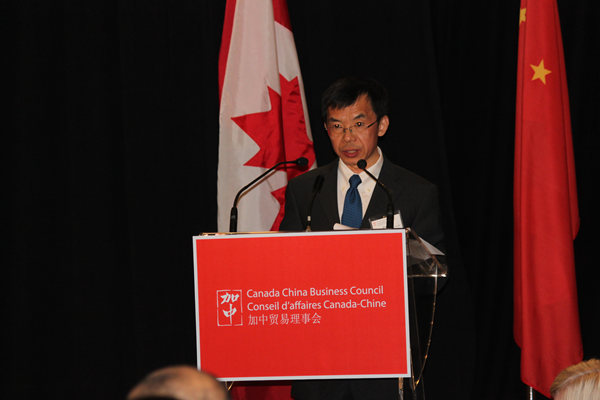New ambassador to Canada: country need not fear SOEs
 |
|
Lu Shaye, the newly appointed Chinese ambassador to Canada, discusses China's commitment to promoting a stronger bilateral relationship with Canada at a business luncheon hosted by the Canada China Business Council on Tuesday in Toronto. NA LI / CHINA DAILY |
Canadians should not be wary of China's state-owned enterprises, said the new Chinese ambassador to Canada.
Ambassador Lu Shaye spoke at a business luncheon hosted by the Canada China Business Council on Tuesday in Toronto.
"After I came to Canada, through reading newspapers and getting in touch with various people, I found that the Canadian public has three major concerns in terms of China-Canada FTA," Lu said.
"The first, there is prejudice against China's state-owned enterprises, (looking) to prohibit the latter from entering the Canadian market," he said.
"The second, people are worried that Chinese enterprises would buy Canadian oil sands and high-tech enterprises.
"The third, people propose to involve human rights into the FTA negotiations," he said.
China's state-owned enterprises (SOEs) have long been a concern to Canadians. A survey conducted by pollster Nik Nanos for The Globe and Mail said that there's a significant level of concern with an enhanced free-trade agreement with China.
The survey found that almost 90 percent of Canadians don't want the Trudeau government to grant China's SOEs unfettered access to the country's economy, and a solid majority want Ottawa to link human rights to talks on a free-trade deal with the world's second-largest economic power.
"Canadian public opinion worries that the Chinese investments will buy out Canada; it is totally unnecessary indeed," Lu said.
"Just like other private-owned and foreign-invested enterprises, China's SOEs are all operating according to market rules. The difference lies in that SOEs not only pay taxes to the country, but also contribute profits to the country to invest in infrastructure and public service. China's SOEs are not evil, but a babysitter who cares for people's lives."
Talking about buying oil sand enterprises and high-tech enterprises, Lu said Chinese enterprises buying Canadian oil sand enterprises are actually "incurring loss".
Oil sands are a mix of sand, clay and water covered with a viscous form of petroleum called bitumen.
The market for Canadian oil sands is not competitive, given the current low international oil price.
"Even if Canadians did not disapprove of China's investment in the oil sand industry, I do not believe that Chinese enterprises would still be interested in this," Lu said.
As for the cooperation between Chinese and Canadian high-tech enterprises, Lu said it is mutually beneficial and shouldn't be a national security concern.
"China is the victim of foreign cyber-espionage activities, rather than the perpetrator," he said. "To be frank, in many high-tech areas, China is not lagging behind but more advanced than Canada."
As to whether human rights should be involved in the two sides' free trade agreement talks, Lu said that China does not want too many non-trade or non-commercial factors in the talks.
"This does not mean that we are afraid of these topics," Lu said. "China has managed to lift 700 million people from poverty over the last two or three decades, which is the greatest human rights achievement in human history. … All roads lead to Rome, and the roads to democracy and human rights differ from country to country."
Lauren Heuser, an editorial fellow who wrote for the National Post, also said Canadians don't have to fear state-owned enterprises.
"Empirical evidence indicates that foreign investment strongly benefits our economy. It introduces productivity improvements (by bringing new practices, technologies and investment in research and development) and increases the competitiveness of our industries."
Some 14,000 Canadian enterprises have been set up in China, while only 270 Chinese enterprises have been established in Canada, according to Chinese official statistics.
Meanwhile, according to Canadian statistics, China's direct investment in Canada accounts for only 2.7 percent of the country's total foreign direct investment.
"We hope to further enhance investment cooperation between the two countries," Lu added.
renali@chinadailyusa.com















